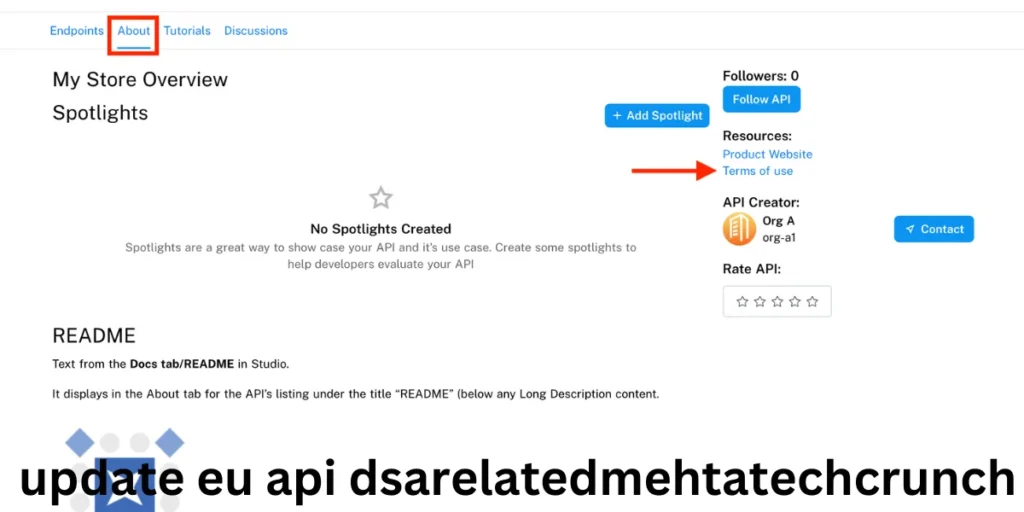In the rapidly evolving landscape of digital technology, data sharing has become a critical component for fostering innovation, ensuring competitiveness, and driving economic growth.
The recent update to the EU API DSA (Digital Services Act) marks a significant milestone in this journey, aiming to establish a more transparent, secure, and competitive data ecosystem across Europe.
In this comprehensive article, we delve into the nuances of this update, exploring its implications, benefits, and the future of data sharing in the EU.
Also read: Window Snyder Microsoft Mozilla Applefranceschibicchieraitechcrunch |group vc azevedotechcrunch | myaci albertsons | adobe generative expand photoshopwiggerstechcrunch
Understanding the EU API DSA Update
The Digital Services Act (DSA) is a pivotal regulation introduced by the European Union to create a safer digital space where the fundamental rights of users are protected, and to establish a level playing field to foster innovation, growth, and competitiveness.the update eu api dsa related mehta techcrunch
The recent update to the update eu api dsa specifically addresses the mechanisms and protocols for data sharing between digital services, emphasizing security, transparency, and interoperability.
Key Objectives of the update eu api dsa related mehta techcrunch
- Enhancing Data Security: One of the primary goals of the update is to bolster the security measures surrounding data sharing. This includes stringent requirements for encryption, access control, and data integrity to prevent unauthorized access and breaches.
- Promoting Transparency: The update mandates clearer guidelines on how data is collected, used, and shared. This transparency is crucial for building trust among users and ensuring compliance with privacy regulations such as the GDPR (General Data Protection Regulation).
- Ensuring Interoperability: By standardizing the protocols for data sharing, the update aims to facilitate smoother interactions between different digital services. This interoperability is essential for creating an integrated digital market where data can flow seamlessly across platforms and borders.
Benefits Do Consumers Gain from the update eu api dsa related mehta techcrunch
The update to the Digital Services Act (DSA) brings several significant benefits to consumers, ensuring a safer and more transparent digital environment. Here are the key advantages:.
Improved Transparency
The update mandates clearer guidelines on how data is collected, used, and shared. This transparency allows consumers to understand how their personal information is being handled, fostering greater trust in digital services.
Better Service Integration
With a focus on interoperability, the update eu api dsa promotes smoother interactions between different digital services. Consumers benefit from more integrated and seamless experiences, as data can flow more efficiently across platforms and borders.
Greater Control Over Personal Data
Consumers are empowered with more information about their data usage. The transparency requirements enable users to make informed decisions about their personal information and exercise greater control over how it is shared and used.
Enhanced User Experience
The emphasis on secure and interoperable data sharing leads to improved digital services. Consumers can enjoy faster, more reliable, and user-friendly applications, contributing to a better overall experience.
Increased Trust in Digital Services
By implementing stringent security and transparency measures, the update eu api dsa helps build consumer confidence in digital services. Users can trust that their data is being handled responsibly, which encourages more active and engaged participation in the digital economy.
Implications for Businesses and Consumers The update eu api dsa related mehta techcrunch

The updated EU API DSA has far-reaching implications for both businesses and consumers. Understanding these impacts is vital for stakeholders to navigate the new regulatory landscape effectively.
For Businesses
Increased Compliance Requirements: Businesses operating within the EU or dealing with EU citizens’ data must adhere to the new compliance standards. This includes implementing robust data protection measures and ensuring transparency in data handling practices.
Opportunities for Innovation: The emphasis on interoperability and secure data sharing opens new avenues for innovation. Businesses can leverage shared data to develop new products and services, enhance customer experiences, and gain a competitive edge.
Challenges of Adaptation: While the update offers numerous benefits, it also presents challenges. Companies need to invest in upgrading their data infrastructure, training their staff, and possibly re-engineering their data handling processes to meet the new standards.
For Consumers
Enhanced Privacy and Security: Consumers stand to benefit significantly from the update. With stricter security protocols and greater transparency, users can have more confidence that their data is being handled responsibly and securely.
Improved Service Integration: The focus on interoperability means consumers can enjoy more integrated and seamless digital services. This could translate to better user experiences and more efficient access to services.
Greater Control Over Data: The transparency requirements empower consumers with more information about how their data is used and shared. This enables them to make more informed decisions and exercise greater control over their personal information.
Also read: dow jones fintechzoom | learn to sit back and observe. not everything need – tymoff
The Role of Technology in Data Sharing
Advancements in technology play a crucial role in the successful implementation of the EU API DSA update. Key technological trends and tools are pivotal in enhancing data sharing practices.
Blockchain Technology
Blockchain offers a decentralized and secure way to manage data transactions. Its immutable nature ensures that data sharing is transparent and tamper-proof, making it an ideal solution for ensuring the integrity and security of shared data.
Artificial Intelligence and Machine Learning
AI and machine learning algorithms can enhance data processing and analysis, making it easier to derive actionable insights from shared data. These technologies also play a role in identifying and mitigating potential security threats.
APIs (Application Programming Interfaces)
APIs are the backbone of modern data sharing. They enable different software systems to communicate and exchange data efficiently. The update eu api dsa emphasizes standardized APIs to promote interoperability and seamless data flow between services.
Also read: schedule sign in process macy’s employee Guide | https //www.microsoft.com /Link Stopped working
Future Trends in Data Sharing
The landscape of data sharing is set to evolve further with emerging trends and innovations. Staying abreast of these trends is crucial for businesses and consumers alike.
Federated Learning
Federated learning allows multiple organizations to collaboratively train machine learning models without sharing raw data. This technique enhances privacy and security while enabling the development of robust AI models.
Data Marketplaces
Data marketplaces are platforms where data can be bought and sold. These marketplaces promote the monetization of data while ensuring compliance with privacy regulations. They also facilitate access to high-quality data for businesses and researchers.
Zero-Knowledge Proofs
Zero-knowledge proofs are cryptographic techniques that allow data verification without revealing the underlying data. This technology can enhance privacy and security in data sharing, making it possible to verify identities or transactions without exposing sensitive information.
Also read: bang chan net worth | Increaseupcard.org | A Complete Guide | dan bongino wife accident
Conclusion
The update eu api dsa represents a significant step towards a more secure, transparent, and interoperable data ecosystem in Europe. By understanding the objectives, implications, and technological underpinnings of this update, businesses and consumers can better navigate the evolving landscape of data sharing. As technology continues to advance, the potential for innovation and growth in this space is immense.
FAQ
1. What is the EU API DSA?
The EU API DSA (Digital Services Act) is a regulation introduced by the European Union to create a safer digital space and establish a level playing field for innovation and competition. The recent update focuses on data sharing between digital services, emphasizing security, transparency, and interoperability.
2. How does the DSA update impact businesses?
Businesses must comply with new standards for data protection and transparency, which may require investments in data infrastructure and staff training. However, the update also opens opportunities for innovation and improved customer experiences through enhanced data sharing practices.
3.What are zero-knowledge proofs, and how do they enhance data sharing security?
Zero-knowledge proofs are cryptographic techniques that allow data verification without revealing the underlying data. This technology enhances privacy and security by enabling the verification of identities or transactions without exposing sensitive information.
4.How can businesses prepare for the changes brought by the DSA update?
Businesses should invest in upgrading their data infrastructure, training their staff, and re-engineering data handling processes to meet the new standards. Staying informed about technological trends and regulatory requirements is crucial for navigating the evolving data sharing landscape.






